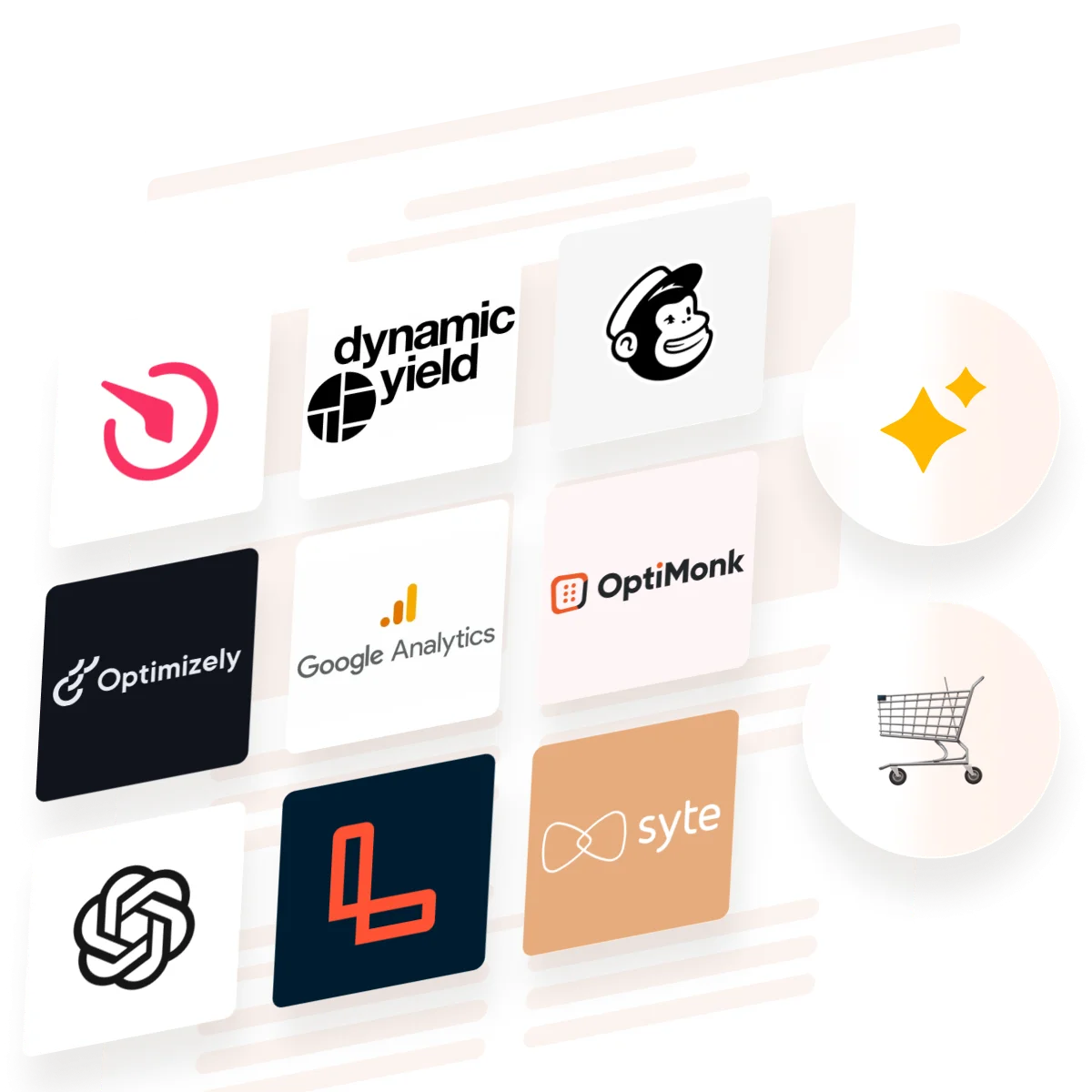Artificial Intelligence is transforming the ecommerce industry, reshaping how businesses operate and engage with customers. As consumer expectations rise, AI tools are helping ecommerce businesses provide smarter, more personalized experiences. From enhancing customer service and streamlining operations to optimizing sales and preventing fraud, AI is becoming essential for staying competitive in the fast-paced digital marketplace.
In this article, we’ll explore the must-have AI ecommerce tools, how they can be leveraged for success, and how businesses can harness their power to boost sales, improve customer satisfaction, and drive growth.
Must-Have AI Tools for E-Commerce: Table
| Tool | Functionality | Brief Description |
|---|---|---|
| Elfsight AI Chatbot | Customer Support Chatbot | Automates customer support, answering queries and offering product suggestions. |
| Dynamic Yield | Personalization Engines | Provides tailored recommendations and personalized shopping experiences based on customer behavior. |
| Mailchimp | Email Automation | AI-driven email marketing platform that automates campaigns, segmentations, and A/B testing. |
| Optimizely | Predictive Analytics | AI-powered analytics for demand forecasting, inventory optimization, and sales predictions. |
| Google Analytics | Web Analytics | Uses AI to analyze traffic data, user behavior, and trends to optimize online marketing and e-commerce strategies. |
| Optimonk | Conversion Optimization | Uses AI for exit-intent popups, in-site messaging, and dynamic content to boost conversions. |
| ChatGPT | Conversational AI | Leverages AI to provide conversational support, content generation, and personalized user interaction for enhanced engagement. |
| Lexalytics | Customer Insights | Analyzes customer feedback and reviews using AI to categorize sentiment and provide actionable insights. |
| Syte | Visual Search & Discovery | AI-powered visual search engine that allows customers to search products using images, increasing discoverability. |
| Qubit | Customer Journey Mapping | Uses AI to track and optimize the customer journey across multiple touchpoints, improving user experience and retention. |
| Signifyd | Fraud Detection | AI-powered fraud prevention platform that identifies and prevents fraudulent transactions in real-time. |
| Copy.ai | Content Creation | Generates high-quality, SEO-friendly content for product descriptions, blog posts, and more. |
1. Elfsight AI Chatbot
Why use: Instant, automated customer support is essential for e-commerce businesses.
The Elfsight AI Chatbot widget is an advanced tool designed to streamline customer interactions, offering instant support, personalized experiences, and round-the-clock assistance on your website. It combines cutting-edge AI technology to improve customer engagement, automate repetitive tasks, and reduce response times.
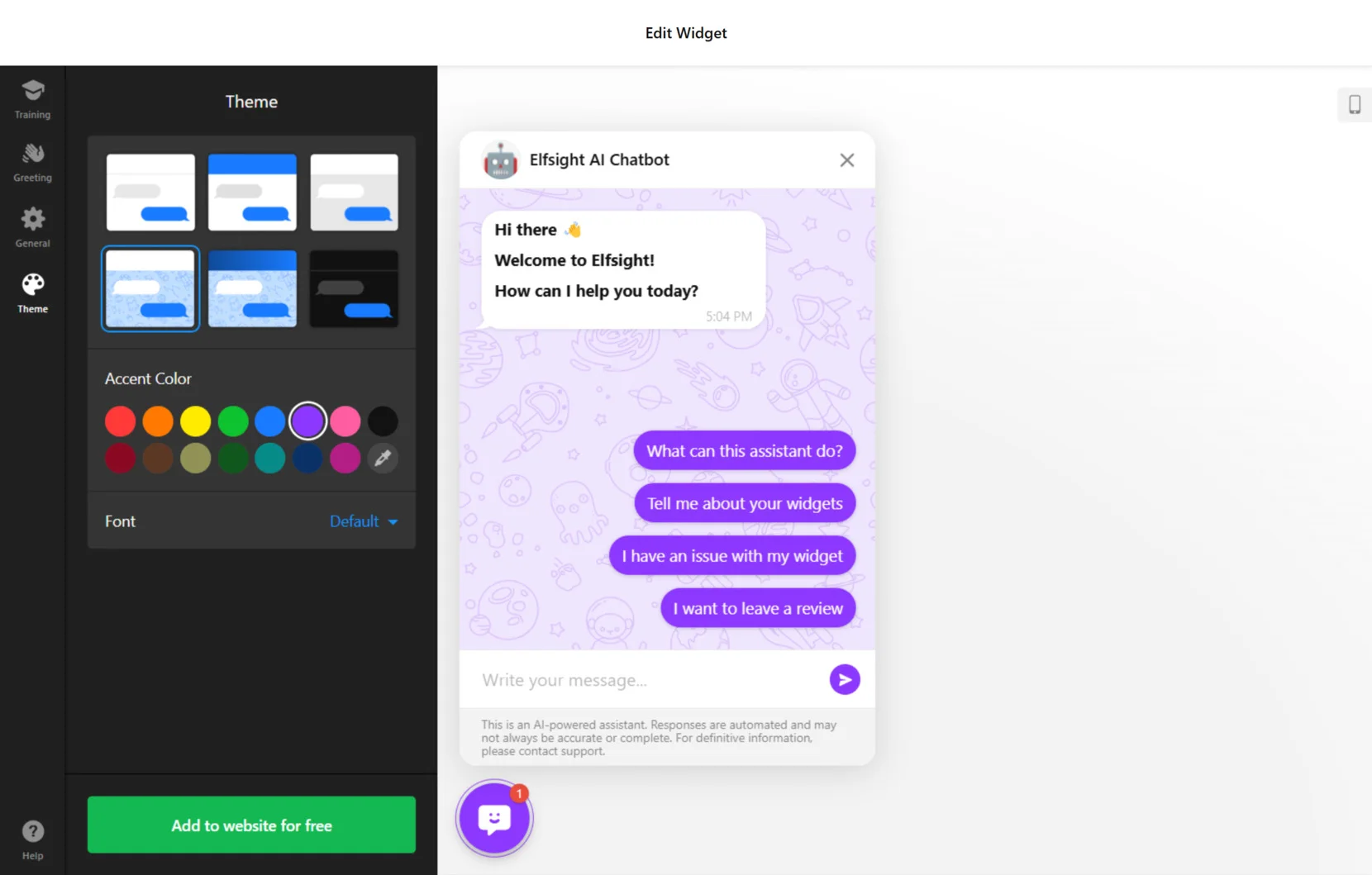
Key features:
- 24/7 availability. The chatbot operates non-stop, answering customer questions at any hour, ensuring a seamless experience even when human agents are unavailable.
- Multilingual support. With the ability to communicate in multiple languages, it makes it easier for businesses to serve customers across different regions, enhancing global reach.
- Customizable responses. Businesses can personalize chatbot responses with Q&A pairs and training files in various formats (PDF, TXT, DOCX, etc.), ensuring accurate, context-sensitive replies.
- Follow-up messaging. The tool can automatically send reminders or follow-up messages to customers, ensuring that no query goes unanswered and engagement remains high.
- Personalized conversations. It addresses customers by name, remembers preferences, and provides tailored responses, helping to create a more human-like interaction that strengthens customer relationships.
Small and medium-sized ecommerce businesses looking to improve customer support; companies seeking a quick solution to automate customer interactions.
Integration and setup:
This ecommerce chatbot integrates easily with platforms like Shopify, WordPress, Wix, and Squarespace. The setup process is user-friendly, requiring no coding, and businesses can embed the chatbot into their websites quickly.
Pricing: free plan with basic features; premium plans start at $5 per month.
Build your own ecommerce chatbot right now with our intuitive editor!
2. Dynamic Yield
Why use: Personalization directly impacts conversion rates and customer loyalty by tailoring experiences to individual users.
Dynamic Yield is a leading AI-powered personalization platform that enables e-commerce businesses to optimize customer experiences across web, mobile, email, and more. By leveraging advanced machine learning algorithms, this AI-poweder ecommerce service allows businesses to deliver highly targeted, personalized content and recommendations, driving greater customer engagement and conversion rates.
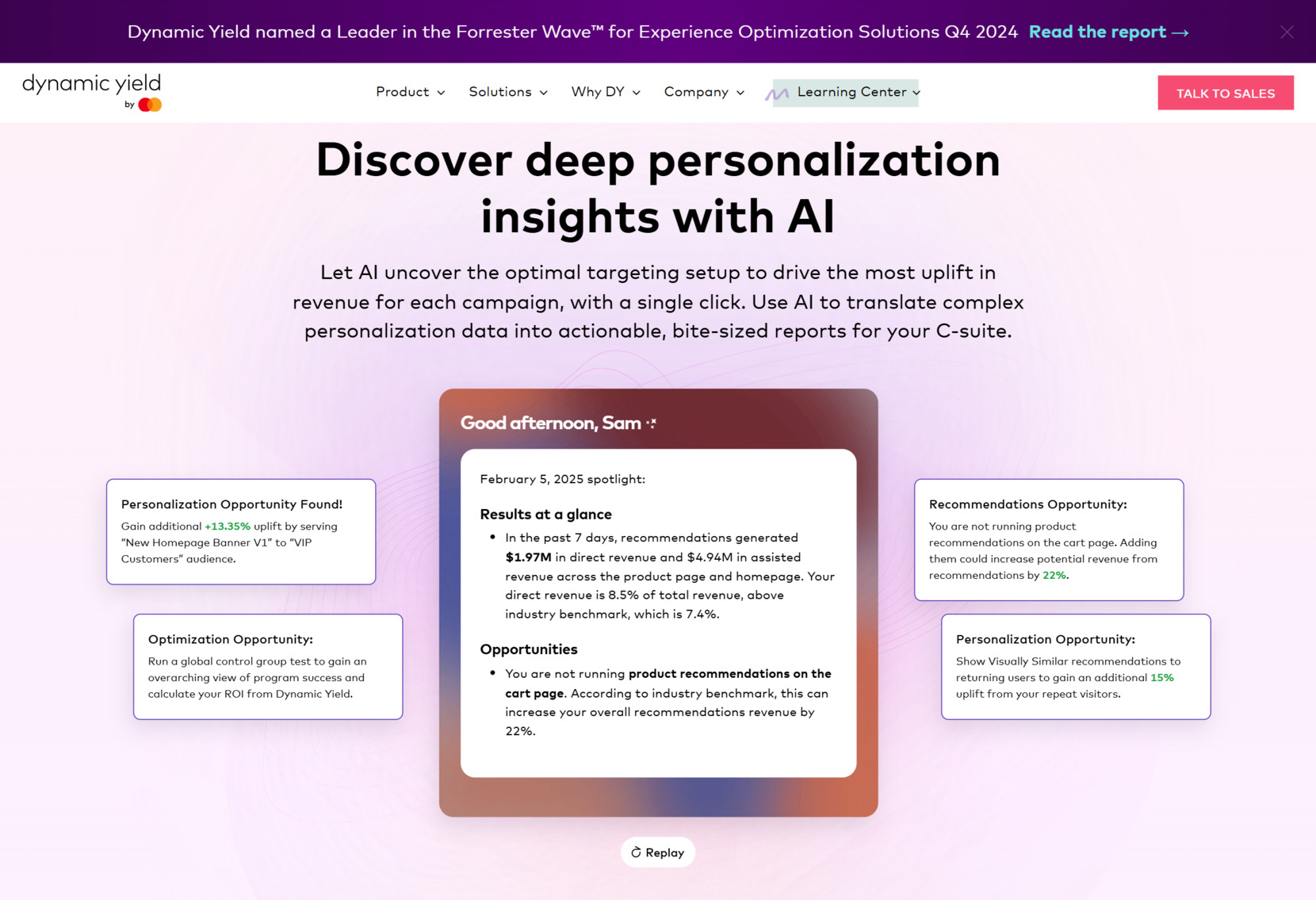
Key features:
- Omnichannel personalization. It enables seamless personalization across all touchpoints, including websites, mobile apps, and emails, ensuring consistency in the customer experience.
- AI-powered recommendations. The platform offers algorithmic product recommendations, dynamically adjusting to a customer’s behavior, preferences, and purchase history.
- Real-time decisioning. Powered by AdaptML, Dynamic Yield’s AI decision engine predicts the next best actions in real-time, optimizing content and offers for every user.
- A/B testing and optimization. It provides robust experimentation capabilities, enabling businesses to test different variations of content, offers, and layouts to maximize performance.
- Visual personalization. The platform integrates with image recognition tools, enabling businesses to deliver visually personalized experiences to customers based on their preferences.
Medium to large ecommerce businesses looking to scale their personalization efforts; companies with a large customer base and diverse product offerings, aiming to drive higher conversions and improve user engagement.
Integration and setup:
Dynamic Yield integrates with a variety of platforms and tools, including ecommerce platforms like Shopify, Magento, and BigCommerce, as well as CRM systems and analytics tools. Integration is straightforward and does not require extensive technical expertise, making it suitable for businesses of various sizes.
Pricing: based on business size and needs.
3. Mailchimp
Why use: Email marketing is a core component of e-commerce success. AI-powered email automation improves segmentation, targeting, and campaign optimization, leading to higher customer retention and sales.
Mailchimp is an all-in-one marketing platform designed to help businesses manage and automate email campaigns. Using AI-driven features, it assists e-commerce companies in delivering highly personalized and targeted email content, boosting customer engagement and driving conversions.
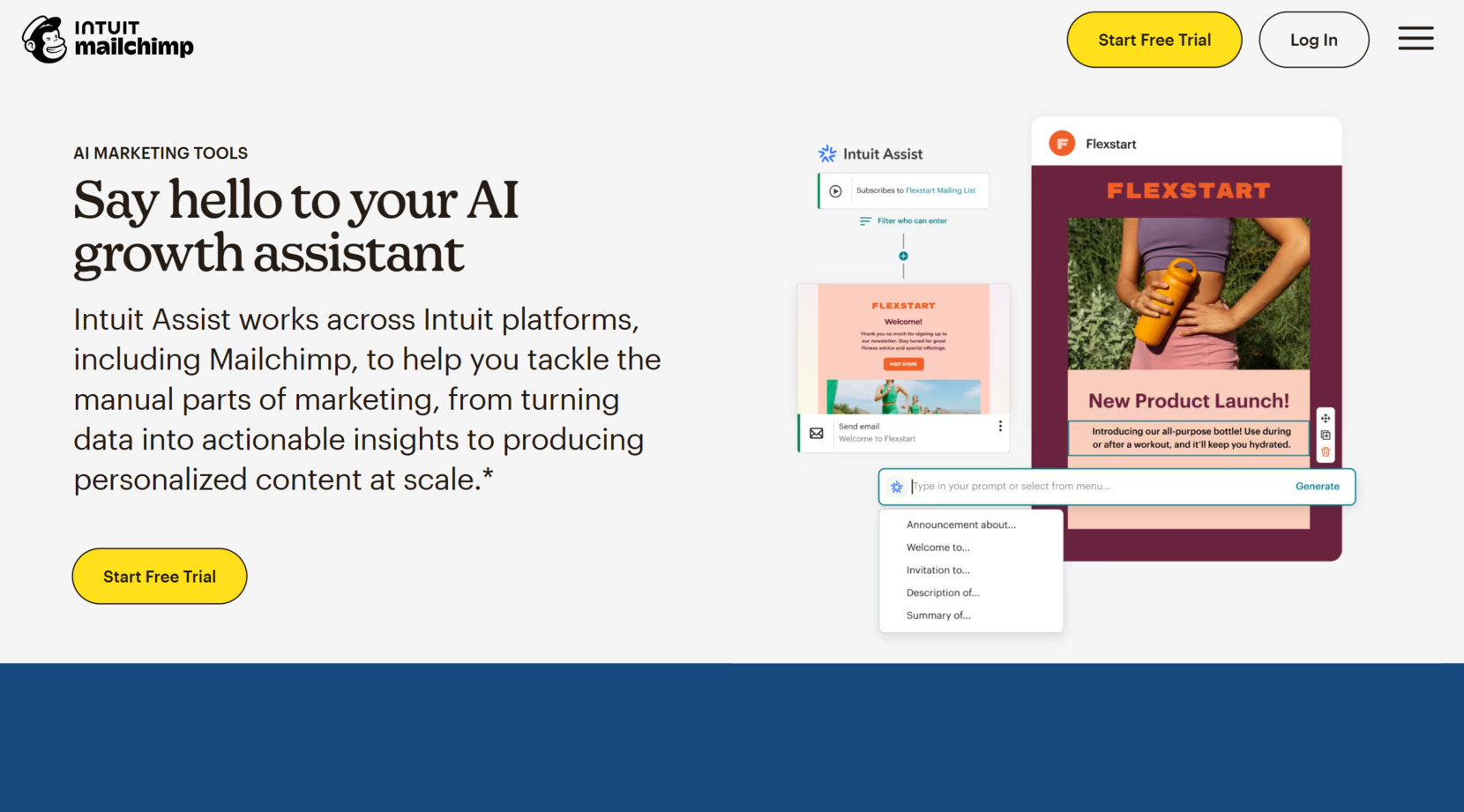
Key features:
- Personalized email campaigns. AI algorithms suggest the most effective content for each customer based on past behavior, preferences, and purchasing history.
- Automated workflows. Create automated email sequences for abandoned carts, welcome emails, and product recommendations, ensuring timely communication without manual effort.
- Segmentation and targeting. AI helps businesses segment their audience and send targeted emails that resonate with specific customer groups, increasing the chances of conversion.
- Predictive insights. The tool predicts which contacts are most likely to engage with certain content, helping e-commerce businesses prioritize leads and optimize campaigns.
- Content optimization. Mailchimp uses AI to suggest subject lines, optimize send times, and identify the best time to send campaigns, ensuring higher open and click rates.
Small to medium-sized e-commerce businesses looking to automate their email marketing efforts, improve customer targeting, and boost engagement through AI-powered personalization.
Integration and setup:
Mailchimp seamlessly integrates with various e-commerce platforms like Shopify, WooCommerce, and BigCommerce. Setting up is straightforward, and businesses can sync customer data, create personalized campaigns, and launch automated workflows with minimal technical expertise.
Pricing: free plan is available; paid plans start at $20 per month.
4. Optimizely
Why use: Predictive analytics helps businesses make data-driven decisions about inventory, sales, and customer behavior, allowing for smarter forecasting and resource allocation.
Optimizely is a robust platform that leverages AI-powered predictive analytics to help e-commerce businesses enhance customer experiences, optimize conversion rates, and personalize their marketing efforts. By collecting and analyzing customer data, Optimizely allows businesses to create dynamic, data-driven strategies across web, mobile, email, and other channels.
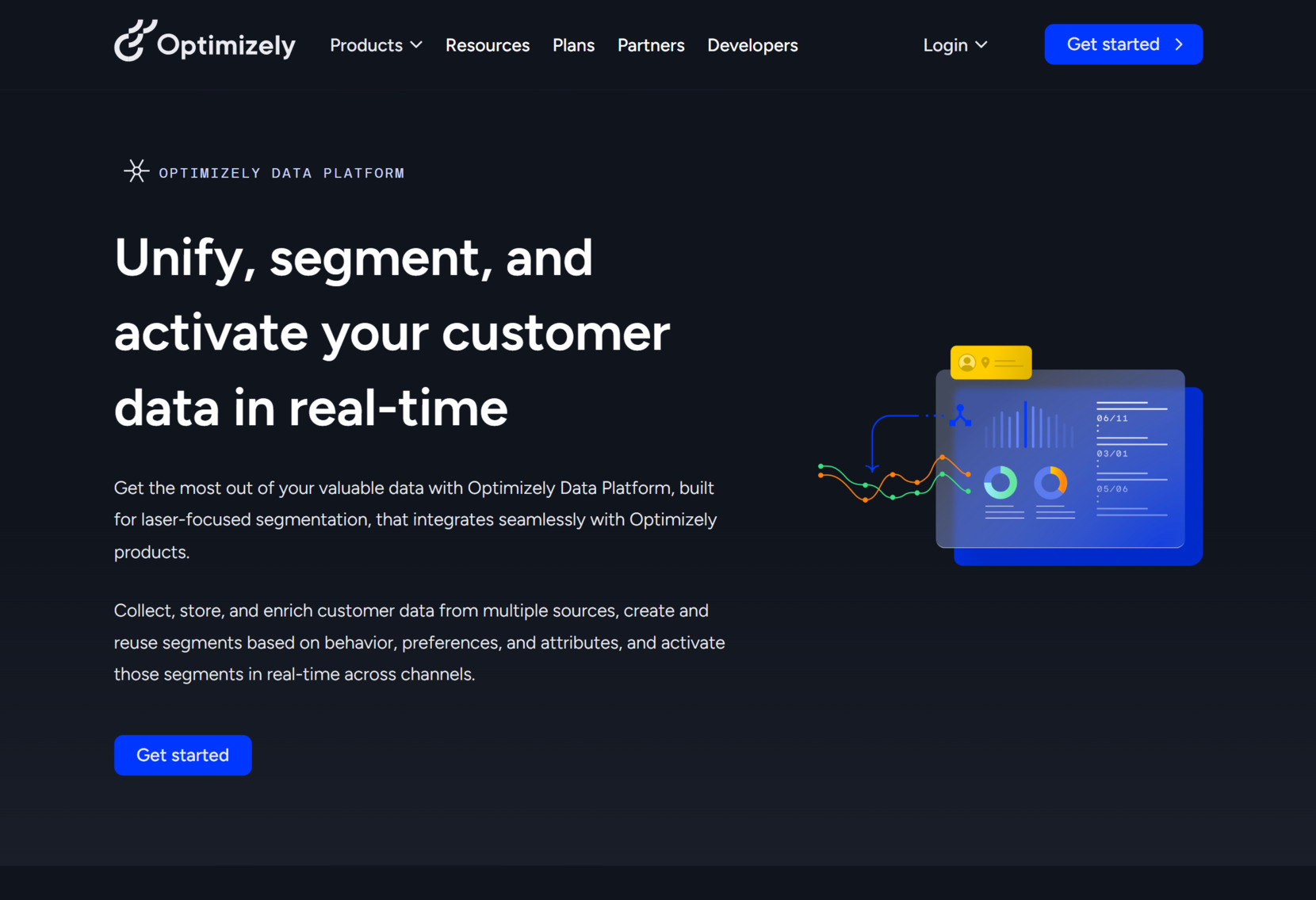
Key features:
- Predictive analytics. AI-driven insights predict customer behavior, enabling businesses to target high-potential buyers, improve sales forecasting, and minimize churn.
- Segmentation. Create precise customer segments based on behaviors, preferences, and attributes for highly tailored marketing efforts.
- Real-time personalization. Deliver personalized experiences instantly based on customer actions and real-time data, driving higher engagement and conversions.
- Multichannel activation. Implement strategies across various channels, such as web, email, mobile, and push notifications, ensuring consistency in messaging.
Medium to large e-commerce businesses that want to scale personalization efforts, increase conversions, and leverage predictive analytics to optimize customer experiences.
Integration and setup:
Optimizely integrates with over 60 data sources, including e-commerce platforms, CRM systems, and email marketing tools. It is designed for seamless data flow, making setup easy for businesses with existing data infrastructure.
Pricing: Customized pricing based on the size of the business and its specific needs.
5. Google Analytics
Why use: Analytics is fundamental for tracking website performance, understanding user behavior, and measuring marketing ROI.
Google Analytics is a powerful web analytics tool that helps ecommerce businesses track and analyze customer interactions on their websites and apps. With AI-powered features like automated insights, it enables businesses to gain deeper, more actionable insights into user behavior, traffic sources, and conversion rates. These AI capabilities help businesses make data-driven decisions to optimize marketing strategies, improve user experiences, and boost overall performance.
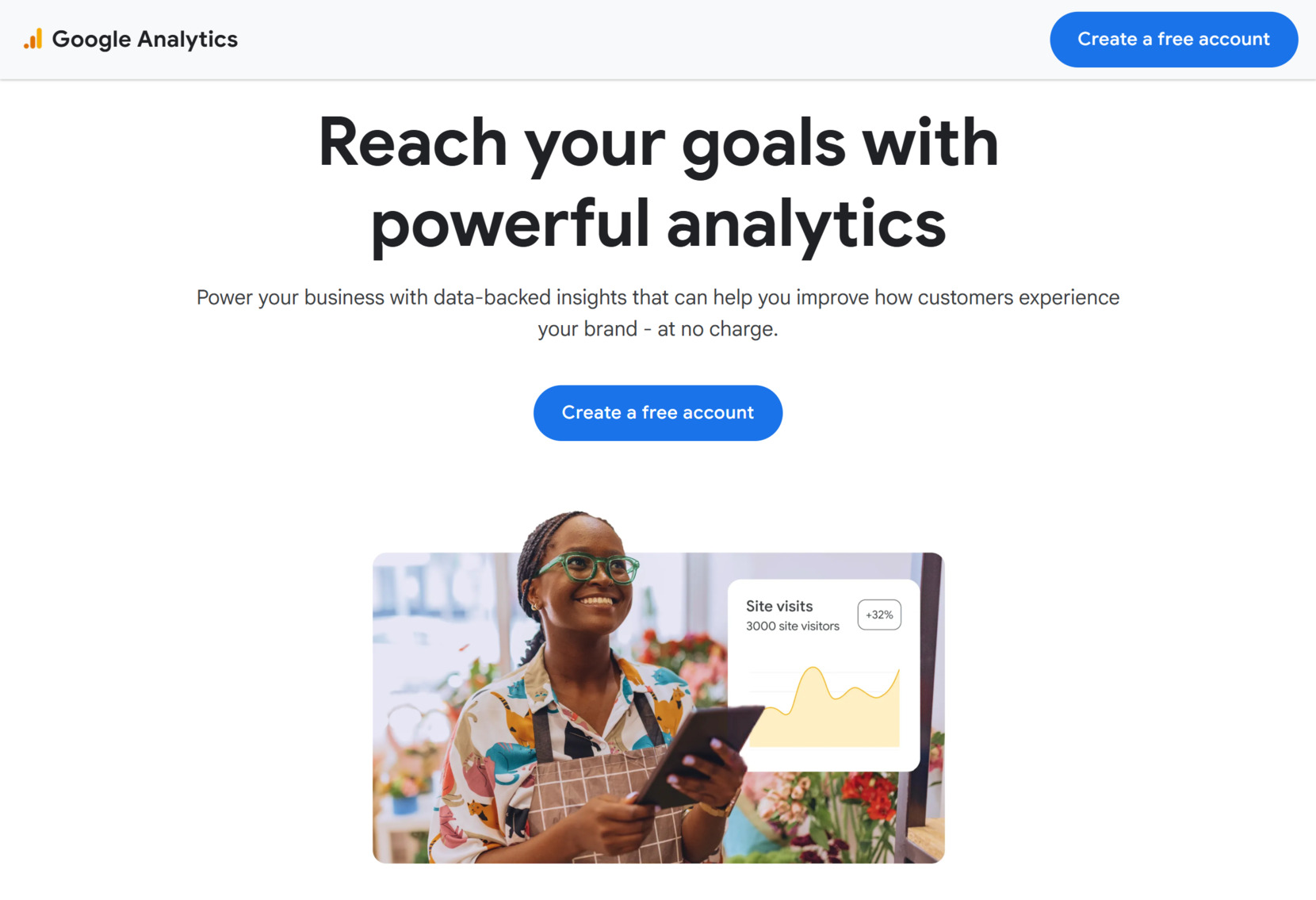
Key features:
- Real-time analytics. Monitor website activity as it happens, including page views, user interactions, and conversions, helping businesses make timely adjustments.
- Customer journey tracking. Track visitors’ paths from initial site visit to conversion, providing deep insights into customer behavior, drop-off points, and opportunities for improvement.
- Audience segmentation. Segment users based on demographics, location, behavior, and device to create highly targeted marketing campaigns and personalized experiences.
- Ecommerce tracking. Google Analytics offers specialized tracking for e-commerce websites, including product performance, revenue, and average order value, enabling better inventory and sales analysis.
- Customizable reports. Build customized dashboards and reports to focus on the metrics that matter most to your business, such as conversion rates, traffic sources, and ROI.
Ecommerce businesses of all sizes looking for a cost-effective, powerful tool to measure and optimize website performance and user engagement.
Integration and setup:
Google Analytics integrates easily with most e-commerce platforms, such as Shopify, WooCommerce, and BigCommerce. The setup process involves adding a tracking code to your website, allowing businesses to start collecting data almost immediately.
Pricing: a free version that covers most e-commerce business needs. For larger businesses or those with more advanced requirements, Google Analytics 360 is available for $12,500 a month.
6. Optimonk
Why use: Conversion rate optimization (CRO) can dramatically increase sales by optimizing website elements like popups, banners, and calls-to-action, targeting users at key points in their journey.
OptiMonk is an AI-driven conversion optimization platform designed to help e-commerce businesses increase sales and improve user experience through personalized messaging. By leveraging machine learning algorithms, OptiMonk delivers targeted, on-site campaigns that engage visitors and reduce cart abandonment, improving conversion rates and overall site performance.
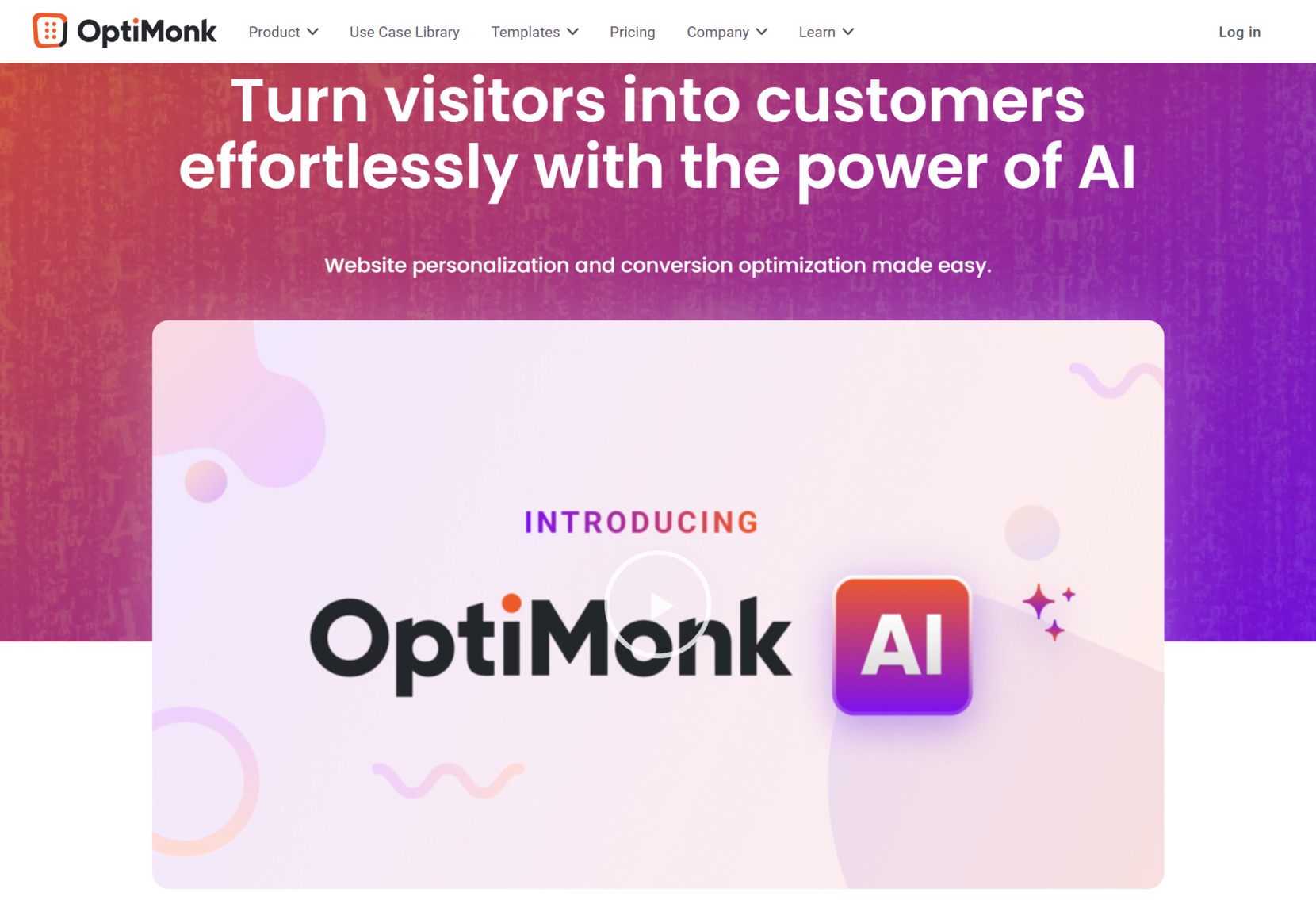
Key features:
- Personalized popups and banners. AI helps create dynamic popups and banners tailored to the visitor’s behavior, location, and interests, providing relevant offers that drive conversions.
- Exit-intent technology. Using AI, the tool identifies when visitors are about to leave the site and triggers exit-intent popups, offering discounts or other incentives to keep potential customers engaged.
- A/B testing. The platform allows businesses to run A/B tests on their popups, banners, and other campaign elements to identify the most effective strategies for different customer segments.
- Customer segmentation. AI-powered segmentation ensures that each visitor receives the most relevant offers based on their browsing behavior, increasing the likelihood of conversion.
- Multi-channel campaigns. OptiMonk enables businesses to run campaigns across various channels, including mobile, desktop, and email, ensuring a consistent user experience.
Small to medium-sized ecommerce businesses looking to optimize their conversion rates without needing a technical background; businesses focused on reducing cart abandonment and improving customer engagement with personalized offers.
Integration and setup:
OptiMonk integrates seamlessly with popular e-commerce platforms like Shopify, WooCommerce, BigCommerce, and others. The setup process is user-friendly and doesn’t require coding, making it easy for businesses to start using it quickly.
Pricing: free plan with limited features is available; premium plans start at $19 per month.
7. ChatGPT
Why use: Enhance customer engagement, create personalized experiences, and streamline content generation (e.g., product descriptions, FAQs).
ChatGPT, developed by OpenAI, is an advanced conversational AI tool that helps businesses engage with customers in real time. While its core functionality excels in customer support and personalized product recommendations, ChatGPT’s AI-powered capabilities extend far beyond just e-commerce. It can also be used for generating creative ideas, brainstorming content, and enhancing marketing efforts, making it a versatile asset for businesses.
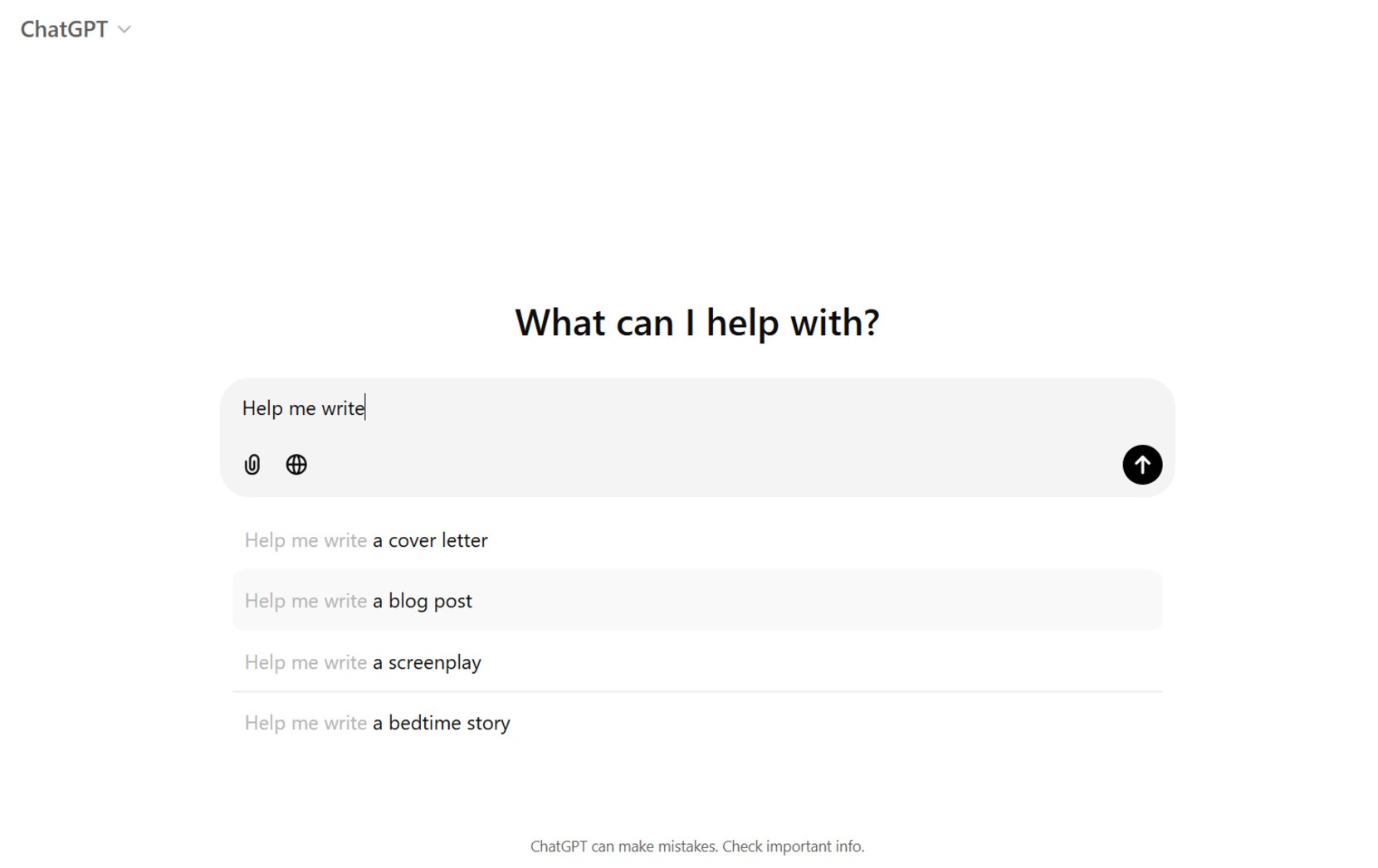
Key Features:
- Real-time customer support. ChatGPT can handle a wide range of customer queries, from order status to product information, providing immediate, accurate responses to visitors on the site.
- Natural language understanding. Thanks to its advanced NLP, ChatGPT provides human-like conversations, which improve the customer experience and foster trust.
- Content creation. ChatGPT assists businesses in generating engaging content for marketing purposes, including blog posts, product descriptions, and social media posts, helping save time and ensuring consistent messaging.
- Idea generation. By analyzing trends, customer feedback, and market data, ChatGPT helps businesses brainstorm creative ideas for marketing campaigns, promotional content, and product development.
Ecommerce businesses of all sizes looking to improve customer support, provide personalized shopping experiences, and enhance marketing efforts.
Integration and setup:
The tool can be integrated through the ChatGPT API with popular ecommerce platforms such as Shopify, WooCommerce, and custom websites. Additionally, businesses can leverage it for content creation, customer service, and marketing outside of website integration, making it a versatile tool for all types of online operations.
Pricing: a free version with essential capabilities is available; premium plans start at $20 per month.
8. Lexalytics
Why use: Understanding customer sentiment and feedback is crucial for improving products, services, and marketing strategies.
Lexalytics is a powerful text analytics platform designed to help businesses extract actionable insights from unstructured text data, including customer reviews, surveys, social media posts, and other forms of feedback. Their AI and natural language processing (NLP) tools help analyze and understand customer sentiment, detect trends, and gain deeper insights into customer behavior, all of which are essential for improving customer experience and making informed business decisions.
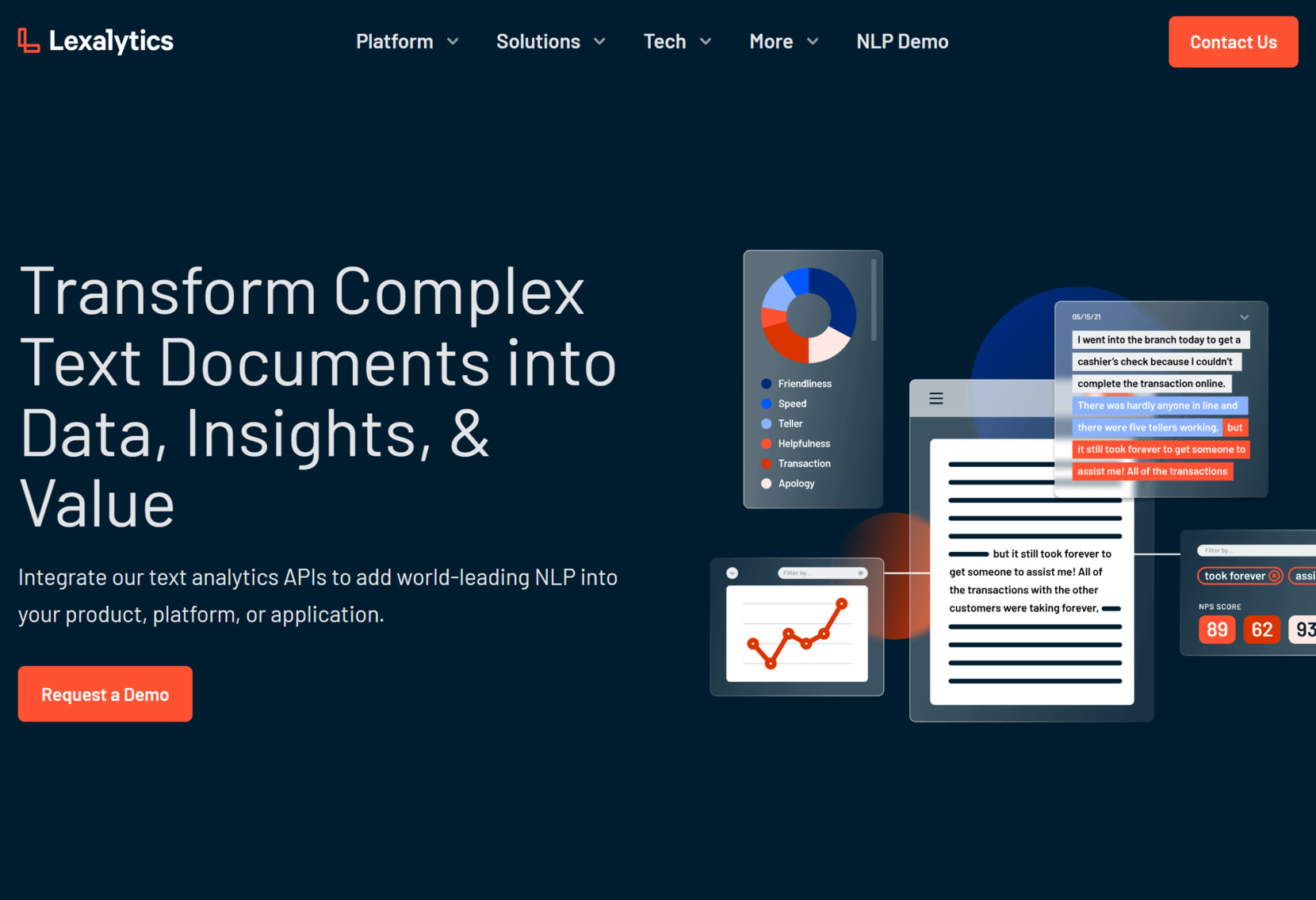
Key features:
- Sentiment analysis. Lexalytics can analyze customer feedback, social media posts, and product reviews to determine the sentiment (positive, negative, neutral), helping businesses understand customer emotions and preferences.
- Entity recognition. Automatically identifies key entities such as names, locations, products, or services in text data, which is useful for categorizing and organizing large volumes of data.
- Theme extraction & topic modeling. Extracts the most common themes and topics from large datasets to identify trends, customer concerns, and emerging issues.
- Text classification. Categorizes large volumes of text data into predefined groups, enabling businesses to track various topics such as product features, customer satisfaction, or service quality.
- Multilingual capabilities. Lexalytics supports over 20 languages, making it a valuable tool for businesses with a global customer base.
Mid-to-large e-commerce businesses, market research firms, and any company that needs to analyze large volumes of textual data.
Integration and setup:
Lexalytics offers flexible integration options, allowing businesses to incorporate the platform with other CRM systems, customer feedback platforms, and business intelligence tools. The solution can be deployed on-premises or in the cloud, giving companies the flexibility to choose their preferred infrastructure.
Pricing: Custom-based depending on the scope of usage, the volume of data, and the specific features required.
9. Syte
Why use: Visual search helps customers find products quickly and easily, especially in industries where product images play a significant role in purchase decisions (e.g., fashion, home décor).
Syte is an AI-driven visual search and discovery tool that transforms how customers interact with products in e-commerce. By using visual recognition, it enables customers to find products by uploading images or clicking on similar items, making the shopping experience intuitive and interactive. The technology enhances product discovery, increases customer engagement, and drives conversions by offering personalized, image-based suggestions.

Key features:
- Visual search. Shoppers can upload images or take photos to find visually similar products, simplifying product discovery and offering a more engaging experience.
- Multi-object detection. Detects multiple items in a single image, allowing customers to explore more options from a single shot, enhancing browsing experience.
- Personalized recommendations. AI suggests related products based on visual similarity, improving upsell and cross-sell opportunities.
- Customizable tags and attributes. Offers businesses the ability to add customized product attributes, enhancing the searchability and relevance of the items shown.
Ecommerce stores that want to create a more engaging shopping experience through visual discovery.
Integration and setup:
Syte’s integration process is straightforward, providing plug-and-play options with popular e-commerce platforms. The tool is easy to implement and doesn’t require significant technical expertise. Businesses can customize the setup to align with their brand’s unique requirements.
Pricing: personalized quotes with the cost of the service tailored to the business needs.
10. Qubit
Why use: Mapping customer journeys across touchpoints is important for optimizing the user experience and driving conversions.
Qubit is an AI-powered personalization platform designed to enhance e-commerce experiences by delivering tailored product recommendations and content to customers. It leverages deep learning algorithms to analyze customer behavior and preferences, enabling businesses to create personalized shopping experiences that drive engagement and increase revenue.
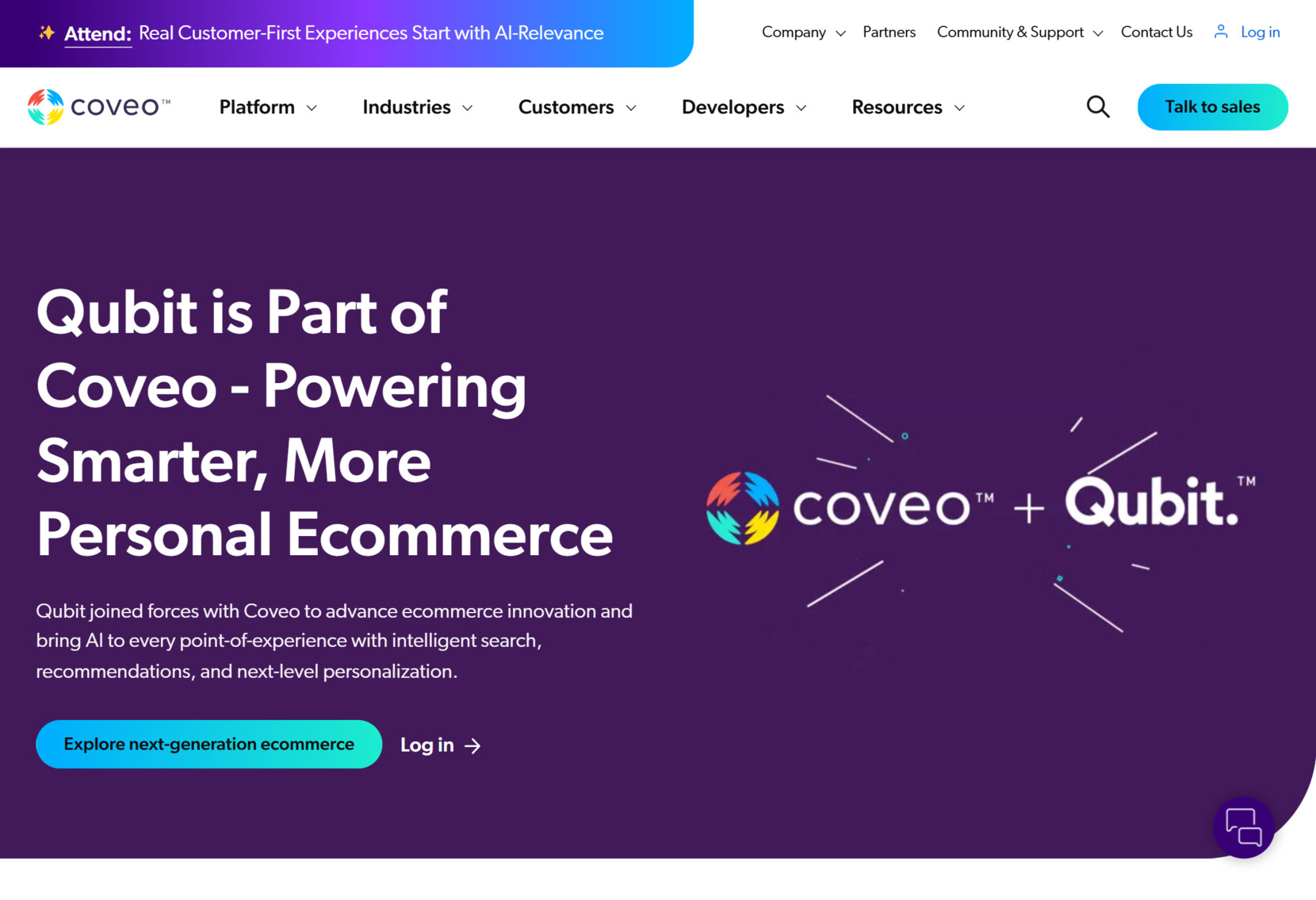
Key features:
- 1:1 product recommendations. Utilizes deep learning to provide personalized product suggestions, enhancing customer engagement and boosting sales.
- Personalized content delivery. Delivers customized content to different audience segments, improving user experience and increasing conversion rates.
- Automated product insights. Offers automated insights across the product catalog, allowing teams to take relevant actions based on data-driven findings.
- Behavioral targeting. Uses AI to understand customer behaviors, helping businesses target specific segments with tailored offers and messaging, which improves conversion rates.
Ecommerce businesses seeking to enhance customer engagement through personalized experiences.
Integration and setup:
Qubit integrates with multiple e-commerce platforms and marketing tools, enabling businesses to incorporate personalized experiences into their existing infrastructure. The platform offers a user-friendly interface and comprehensive support to facilitate smooth implementation.
Pricing: custom pricing based on their specific needs and requirements.
11. Signifyd
Why use: Fraud prevention is crucial for any e-commerce business as it plays a significant role in protecting revenue and minimizing risk.
Signifyd is an AI-powered fraud detection and prevention platform designed for e-commerce businesses. It uses advanced machine learning algorithms to analyze transactions in real-time, detect fraud, and reduce chargebacks, enabling merchants to improve security without affecting the user experience. Signifyd’s solution automates fraud risk assessments and enhances operational efficiency by flagging potentially fraudulent transactions for review, providing comprehensive protection across various online channels.
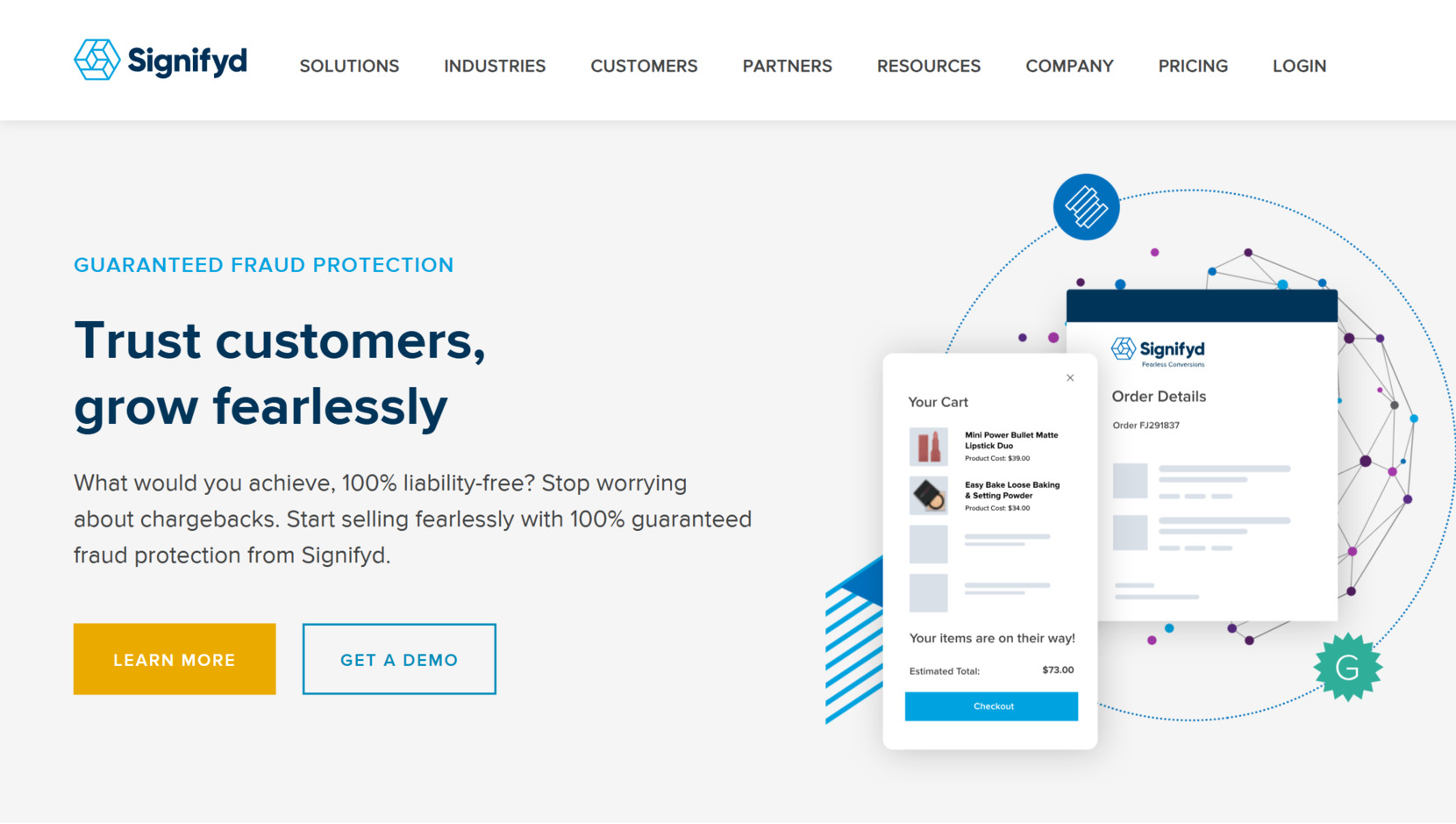
Key features:
- Real-time fraud detection. Utilizes machine learning to analyze transactions in real-time and prevent fraud.
- Chargeback protection. Covers businesses for chargebacks due to fraudulent transactions, ensuring financial security.
- Automated risk assessments. Automatically evaluates transactions for fraud risk and flags high-risk orders for manual review.
- Global coverage. Works across international markets, adapting to local fraud patterns and payment methods.
High-volume ecommerce businesses and those experiencing an increase in fraudulent activity willing to reduce operational burden, ensure safer transactions, and maintain customer trust.
Integration and setup:
Signifyd’s platform integrates with popular e-commerce platforms like Shopify, Magento, and BigCommerce, making it easy to implement its fraud prevention solution within existing workflows. The setup is designed to be intuitive, and merchants can start protecting their stores with minimal technical expertise.
Pricing: custom-based on the business’s transaction volume and risk levels.
12. Copy.ai
Why use: Content creation is important and tools for generating product descriptions, blogs, and marketing copy quickly are valuable helpers.
Copy.ai is an AI-driven content creation platform designed to assist businesses in generating high-quality marketing materials, including blog posts, social media content, and email campaigns. By leveraging advanced machine learning algorithms, The service streamlines the content creation process, enabling teams to produce engaging and relevant content efficiently. This tool is particularly beneficial for marketing teams aiming to enhance productivity and maintain consistent messaging across various channels.
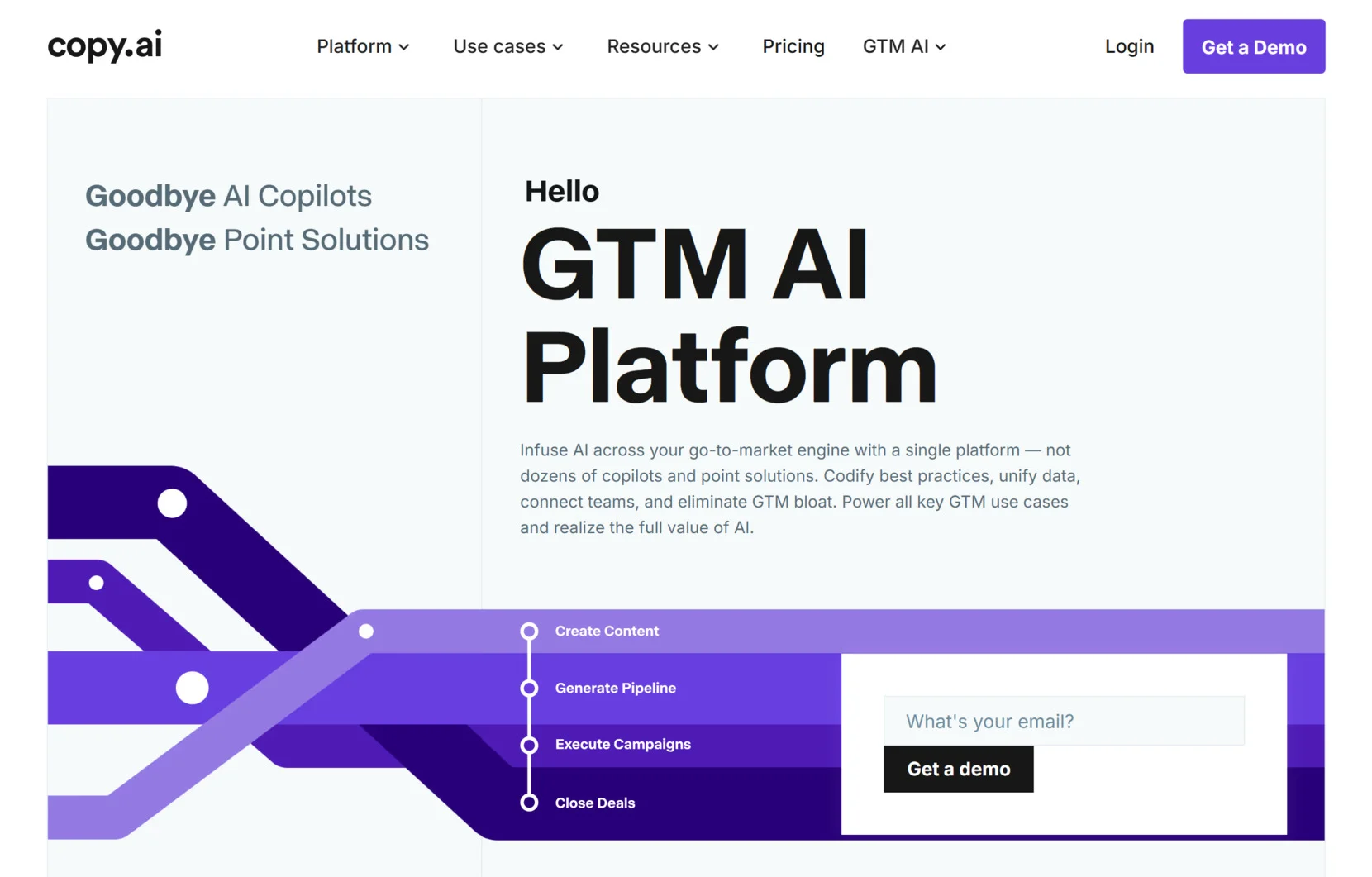
Key features:
- Content generation. Utilizes AI to create diverse content types, such as blog posts, social media updates, and email drafts, reducing the time spent on manual writing.
- Multilingual support. Supports over 25 languages, allowing businesses to create content for a global audience.
- SEO optimization. Provides tools to optimize content for search engines, enhancing visibility and driving organic traffic.
- Collaboration tools. Facilitates team collaboration by allowing multiple users to work on content simultaneously, streamlining the review and approval process.
Marketing teams, content creators of any businesses seeking to enhance their content production capabilities; organizations looking to scale their content marketing efforts, improve efficiency, and maintain a consistent brand voice across multiple channels.
Integration and setup:
Copy.ai integrates with various platforms, including content management systems and social media scheduling tools, enabling seamless incorporation into existing workflows. The platform is designed for ease of use, with a user-friendly interface that requires minimal training.
Pricing: free plan is available; paid plans start at $49 per month.
How AI Tools Can Transform Ecommerce
As discussed earlier, by integrating AI tools into various aspects of ecommerce, businesses can streamline operations, enhance user experiences, and increase profitability.
Here’s how ecommerce AI tools can change the way the industry works:
Personalized Shopping Experience
AI-powered tools like product recommendation engines, personalized email campaigns, and content curation allow e-commerce businesses to deliver highly tailored experiences for each customer. By analyzing customer behavior, purchase history, and browsing patterns, AI helps businesses suggest products that match individual preferences, leading to higher conversion rates and increased sales.
Efficient Customer Support
Webiste bots, such as Elfsight AI chatbot widget, can provide instant support to customers around the clock, answering questions, resolving issues, and guiding users through the purchasing process. This reduces wait times and enhances customer satisfaction, all while freeing up human resources for more complex tasks.
Improved Inventory Management
Ecommerce AI tools can predict demand based on historical data and market trends, helping businesses maintain optimal stock levels. Predictive analytics helps prevent stockouts or overstocking, ensuring that businesses can meet customer demand without tying up too much capital in excess inventory.
Fraud Prevention and Security
Fraud protection tools, such as Signifyd, use AI algorithms to detect unusual purchasing patterns and identify fraudulent transactions in real time. This reduces the risk of chargebacks and financial losses, ensuring a secure shopping environment for customers and businesses alike.
Enhanced Marketing and Advertising
AI tools, like Mailchimp for email marketing and Copy.ai for content creation, enable businesses to create more targeted and effective marketing campaigns. AI optimizes ad placements, determines the best times to send emails, and generates high-quality content automatically, saving time and improving overall marketing efforts.
Streamlined Customer Insights
AI-powered tools like Google Analytics and MonkeyLearn help e-commerce businesses gather valuable insights into customer behavior, preferences, and trends. These tools identify patterns and customer segments, allowing businesses to tailor their strategies and offerings to meet the needs of specific audiences.
Optimized User Experience
AI can improve the overall user experience by personalizing the website’s layout and product recommendations. Visual search tools, like Syte, allow customers to search for products using images, creating a more interactive and engaging shopping experience that increases time spent on site and drives sales.
Time and Cost Savings
By automating repetitive tasks such as content creation, customer support, and inventory management, AI saves valuable time and resources. Ecommerce businesses can reinvest these savings into more strategic areas, such as product development and customer acquisition.
Tips on Effective Usage of Ecommerce AI Tools
To unlock the full potential of the AI tools for ecommerce, you have to use them strategically and effectively. Here are some key tips to ensure you get the most out of the AI tools in your e-commerce business:
- Start with clear objectives. Before implementing any AI tool, define what you want to achieve. Whether it’s improving customer service, boosting sales through personalized recommendations, or automating marketing efforts, understanding your goals will help you choose the right tools and ensure they align with your business strategy.
- Focus on Data Quality. AI tools are only as effective as the data they analyze. Ensure that your customer data is clean, accurate, and up-to-date. This will allow AI to deliver more personalized, relevant, and effective recommendations, emails, and marketing content.
- Integrate AI with Existing Systems. Seamless integration of AI tools with your existing e-commerce platform, CRM, and marketing systems is critical for efficiency. Ensuring the chosen tools work together will help you manage and analyze data in one centralized location, streamlining workflows and avoiding duplication.
- Monitor and Measure Performance. Once AI tools are integrated, continuously monitor their performance to gauge their effectiveness. Regularly reviewing the results will help you adjust your strategies and optimize the use of AI.
- Personalize, But Don’t Overdo It. AI is fantastic for personalizing the customer experience, but it’s important to strike a balance. Over-personalization can sometimes feel invasive or annoying. Focus on offering a seamless, pleasant experience rather than bombarding them with too many suggestions.
- Stay Updated with AI Trends. AI technology is constantly evolving, and staying updated with the latest developments in AI for e-commerce is essential to maintain a competitive edge. Being aware of new features, updates, and trends ensures that you are always using AI to its fullest potential.
- Train Your Team on AI Tools. AI is a tool, not a magic solution. While the technology is powerful, it’s important that your team understands how to use it effectively. Train your staff to leverage AI tools, so that they can interpret data, make informed decisions, and maximize the benefits of AI.
- Combine AI with Human Expertise. While AI can automate many tasks, human insight remains invaluable. Use AI to handle repetitive, time-consuming tasks like customer inquiries or content creation, but ensure that your team focuses on strategic decision-making, creativity, and complex problem-solving. The best results come from combining AI’s speed and scalability with human expertise.
- Ensure Ethical Use of AI. The tools powered by AI collect and analyze customer data, so it’s crucial to prioritize privacy and transparency. Make sure you comply with data protection regulations such as GDPR and inform your customers about how their data is being used. Ethical AI usage not only helps protect your business from legal repercussions but also builds trust with your customers.
FAQ
What are the best ecommerce chatbots for my business?
What are the best chatbots for Shopify stores?
How can I build a chatbot using ChatGPT for my website?
How do I integrate AI tools into my e-commerce website?
How can I use ChatGPT to improve my website’s SEO?
How widespead is the AI usage right now?
Conclusion
AI tools are rapidly becoming an indispensable part of the e-commerce landscape, offering businesses the ability to automate processes, personalize customer experiences, and enhance operational efficiency. From chatbots that provide 24/7 customer support to predictive analytics tools that forecast demand, AI is reshaping how ecommerce businesses interact with their customers and drive growth. With the right AI tools, companies can not only optimize their internal workflows but also deliver more tailored, engaging shopping experiences that lead to higher conversion rates and customer loyalty.


